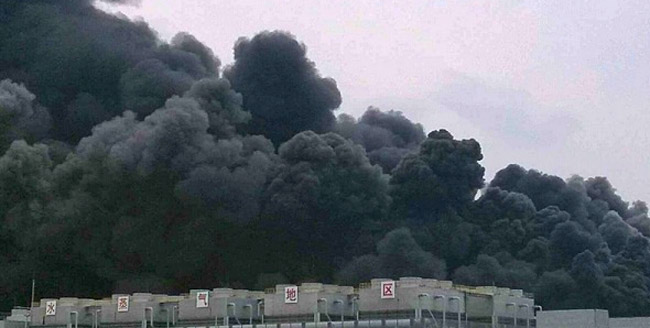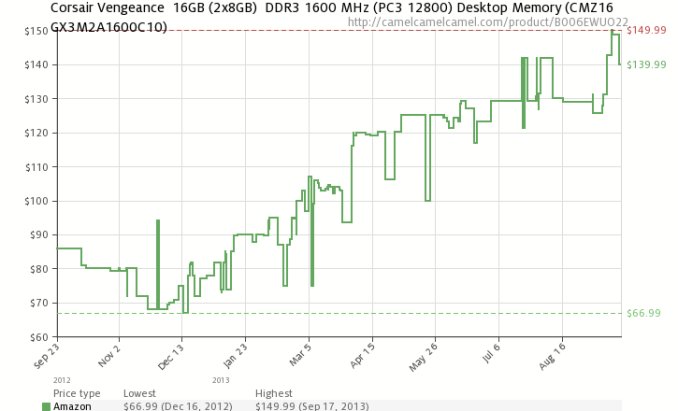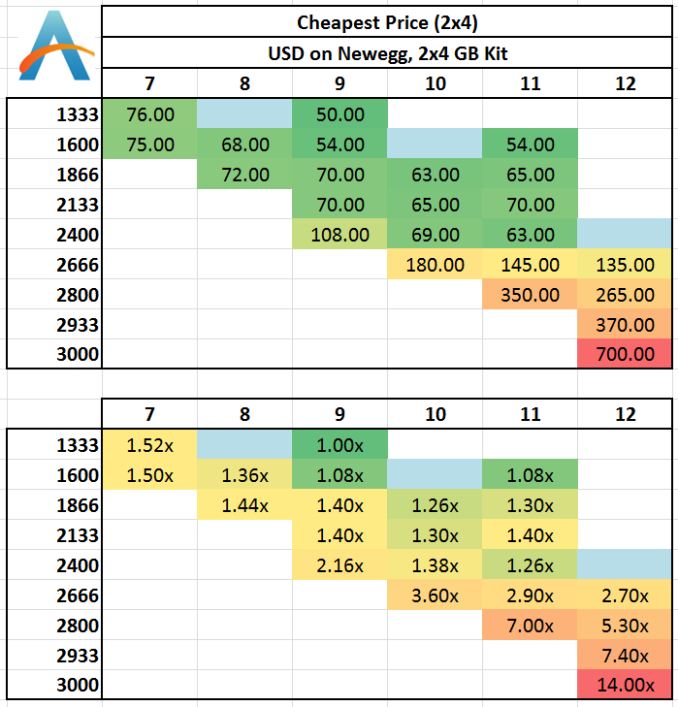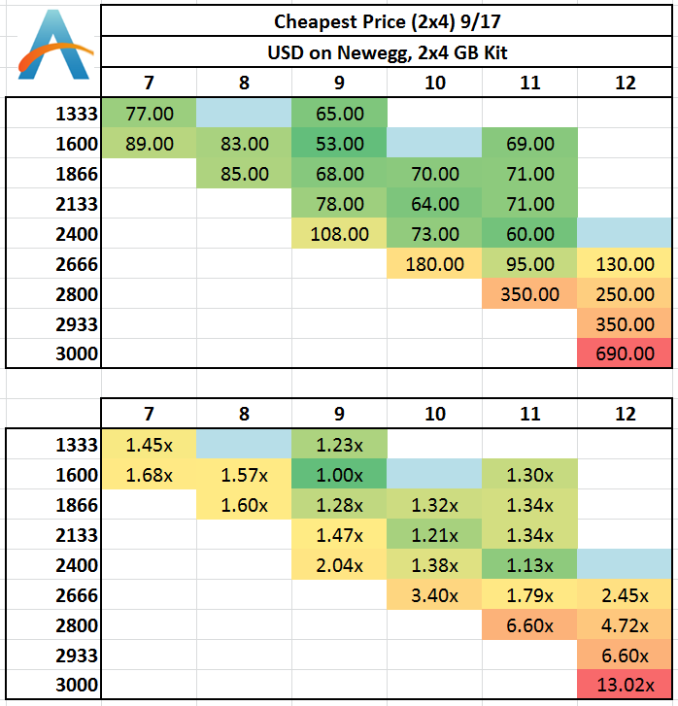Memory Scaling on Haswell CPU, IGP and dGPU: DDR3-1333 to DDR3-3000 Tested with G.Skill
by Ian Cutress on September 26, 2013 4:00 PM ESTPricing and the Effect of the Hynix Fire
When I started testing for this overview, I naturally headed over to Newegg in order to see the prices for memory kits using each of the timings we used. A 2x4 GB memory kit covers most of the major user scenarios, and a 2x8 GB of each is often available for near-double the pricing. As it stood at the beginning of August, we had the following pricing:
At the time, a 1333 C9 was the cheapest at $50, moving up through to $700 for our extreme DDR3-3000 C12 kit. Anything 2666 MHz and above requires a larger bump in price, however the movement from 1333 C9 to 2400 C11 in the grand scheme of things was relatively small ($13) but jumping to 2400 C9 is a 2.16x increase.
However, on September 4th, fire struck Fab 1 and Fab 2 of SK Hynix’s operation in Wuxi, China.

Source: Kitguru
Reports vary, with some suggesting that these Fabs were used for production of NVIDIA GDDR5, and others stating they were part of a general plant manufacturing DRAM. In a statement, SK Hynix has stated that ‘there was no material damage to the fab equipment in the clean room, and thus we expect to resume operations in a short time period so that overall production and supply volume would not be materially affected’.
To put this into context, these Fabs combined produce 12-15% of the world’s supply of DRAM silicon: Hynix themselves command 30% of the memory chip market and Reuters reports that this plant produces around 40-50 percent of Hynix’s total output.
Of course the initial reaction to the incident was directed at pricing. Any suspension of manufactured goods can cause other companies to raise their base line, or the reduction of supply will cause other companies to react and make the most of their production. Memory kits have been rising in price per Gigabyte over the past year anyway, and the prediction of a 10-20% bump in price is not welcome. Using price tracking website camelcamelcamel.com, we chose a few 2x4 GB kits to see how prices have spiked:

A few memory kits show a bump around the Sep 4-10th timeframe, such as the Corsair 1866 C9 kit, the Kingston DDR3-2400 C11 kit and the Patriot 2133 C11 kit. However the majority of kits did not in our small sample. Going back to the original list of prices I obtained from Newegg, I got a fresh set of numbers:
Some pricing has obviously moved – 1333 C9 is now $15 more expensive, and the budget kits are clearly 1600 C9 and 2400 C11. Most of the high end has not moved, although 2666 C11 is now under $100 for a 2x4 GB kit. 1866 C9 is $2 cheaper over the timeframe, but 2133 C9 is $8 more expensive than before. The ultra-high end kits have not adjusted much.












89 Comments
View All Comments
MrSpadge - Thursday, September 26, 2013 - link
Is your HDD scratching because you're running out of RAM? Then an upgrade is worth it, otherwise not.nevertell - Thursday, September 26, 2013 - link
Why does going from 2933 to 3000, with the same latencies, automatically make the system run slower on almost all of the benchmarks ? Is it because of the ratio between cpu, base and memory clock frequencies ?IanCutress - Thursday, September 26, 2013 - link
Moving to the 3000 MHz setting doesn't actually move to the 3000 MHz strap - it puts it on 2933 and adds a drop of BCLK, meaning we had to drop the CPU multiplier to keep the final CPU speed (BCLK * multi) constant. At 3000 MHz though, all the subtimings in the XMP profile are set by the SPD. For the other MHz settings, we set the primaries, but we left the motherboard system on auto for secondary/tertiary timings, and it may have resulted in tighter timings under 2933. There are a few instances where the 3000 kit has a 2-3% advantage, a couple where it's at a disadvantage, but the rest are around about the same (within some statistical variance).Ian
mikk - Thursday, September 26, 2013 - link
What a stupid nonsense these iGPU Benchmarks. Under 10 fps, are you serious? Do it with some usable fps and not in a slide show.MrSpadge - Thursday, September 26, 2013 - link
Well, that's the reality of gaming on these iGPUs in low "HD" resolution. But I actually agree with you: running at 10 fps is just not realistic and hence not worth much.The problem I see with these benchmarks is that at maximum detail settings you're putting en emphasis on shaders. By turning details down you'd push more pixels and shift the balance towards needing more bandwidth to achieve just that. And since in any real world situation you'd see >30 fps, you ARE pushing more pixels in these cases.
RYF - Saturday, September 28, 2013 - link
The purpose was to put the iGPU into strain and explore the impacts of having faster memory in improving the performance.You seriously have no idea...
MrSpadge - Thursday, September 26, 2013 - link
Your benchmark choices are nice, but I've seen quite a few "real world" applications which benefit far more from high-performance memory:- matrix inversion in Matlab (Intel MKL), probably in other languages / libs too
- crunching Einstein@Home (BOINC) on all 8 threads
- crunching Einstein@Home on 7 threads and 2 Einstein@Home tasks on the iGPU
- crunching 5+ POEM@Home (BOINC) tasks on a high end GPU
It obviously depends on the user how real the "real world" applications are. For me they are far more relevant than my occasional game, which is usually fast enough anyway.
MrSpadge - Thursday, September 26, 2013 - link
Edit: in fact, I have set a maximum of 31 fps in PrecisionX for my nVidia, so that the games don't eat up too much crunching time ;)Oscarcharliezulu - Thursday, September 26, 2013 - link
Yep it'd be interesting to understand where extra speed does help, eg database, j2ee servers, cad, transactional systems of any kind, etc. otherwise great read and a great story idea, thanks.willis936 - Thursday, September 26, 2013 - link
SystemCompute - 2D Ex CPU 1600CL10. Nice.